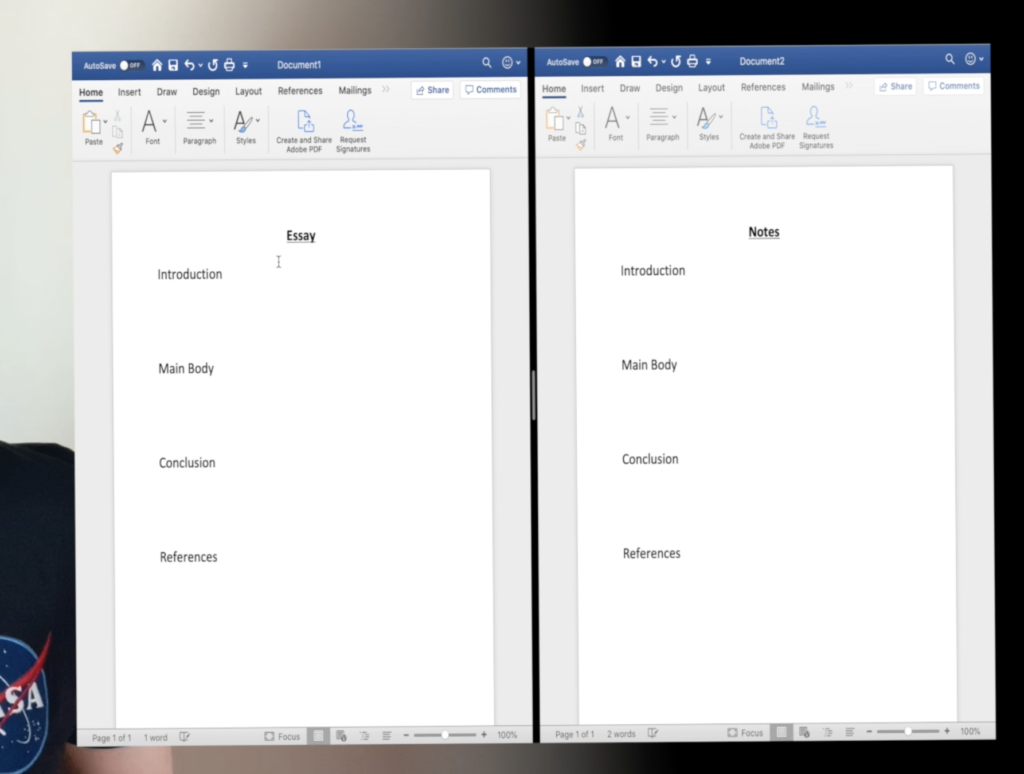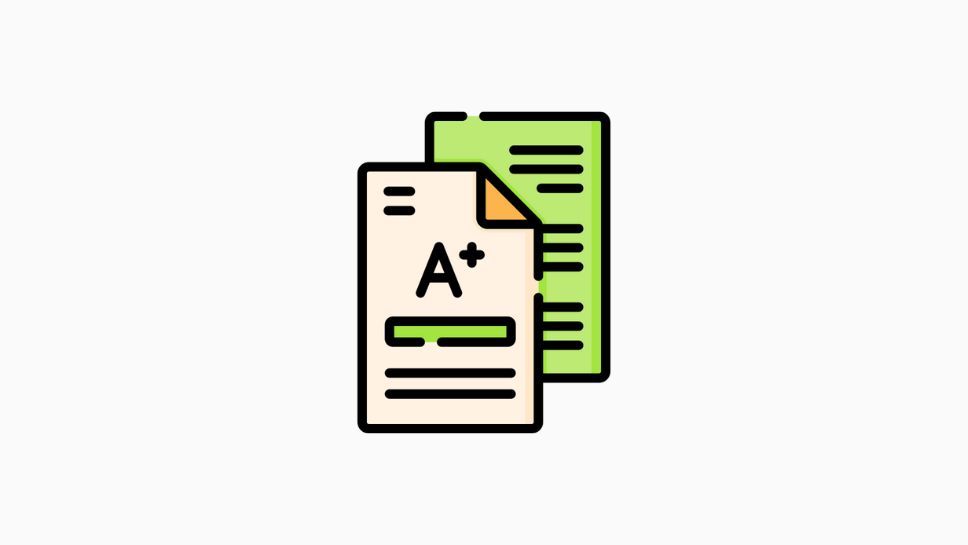Table of Contents
Writing a decent essay in law school is crucial if we want to get top grades. But it’s important to remember that there’s rarely every one single correct way to approach them. There is no blueprint that we can follow step-by-step to give us a first-class result.
Nevertheless, there is a framework for success in legal essays that CAN be followed.
From the moment we get given our essay title to the moment we hand it in, there are some basic principle that we should be aware of that form the foundation of excellent essay writing. And that’s what this article is all about. If you stick around until the end I’ll also be giving you a free guide to help you out even more.
🔎 Research
Before we even think about writing our essay, there are a few preliminary steps. The most important of which is research.
To begin with we need to have two clearly designated areas to write our essay and take our research notes. So simply open up two documents on your computer (e.g. in Word), with one titled ‘essay’ and the other titled ‘notes’. Then divide BOTH of these pages into four sections: introduction; main body; conclusion; and references.

At this stage – the research stage – we’re only interested in our ‘notes’ document.
What is the question asking you?
To research effectively we need to be aware of precisely what the question is asking from us.
Many students fall into the trap of trying to answer the question that they want to answer (because they know that area better), rather than the one that’s actually been given. So spend some time to wrap your head around the question and whether it expects you to ‘discuss’, ‘evaluate’, ‘critically analyse’, etc
What resources should you read?
Once you’ve understood the question, it’s time to begin reading relevant and appropriate academic resources and other scholarly materials.
My advice would be to begin reading the relevant sections of 1-2 textbooks to ensure you have a full appreciation of the topic. From this, you should be able to form a high-level response to the question. In other words, the basic information from the textbooks should allow you to form a rough opinion on the question that drives your deeper research and preparations.
By having a rough understanding of your answer, it makes it a lot easier to identify relevant cases, journal articles, statutes, treaties, and so on. Plus, it will make searching through Westlaw, LexisNexis, or some other legal research database quicker and more useful.
Whenever you find a piece of information that may be useful, remember to drop it into the correct section of our ‘notes’ document and remember to give it a reference straight away. Honestly, references can be incredibly painful if you don’t spend the time to cite your sources straight away. (The amount of time I’ve wasted hunting down a source for something because I didn’t write it down straight away is ridiculous).
Now we have all the information we need, we can think about the structure and writing the substantive part of the essay within our ‘essay’ document.
😁 Introduction
The introduction of your essay should be concise.
The purpose of the introduction is to ensure you have understood what the question is asking you, give the essay an appropriate focus, and presented a clear structure as to how you’re going to answer the question.
Put simply, you need to tell the reader what you’re going to discuss and how they’re going to be led from start to finish, bringing them to your eventual conclusion.
Many students will use the introduction incorrectly, seeing it as an opportunity to intrigue rather than inform. They often believe that an essay is like a story, where the outcome can’t be revealed until the end. But an essay isn’t like a story at all. And effective essays will hint at the eventual conclusion right away.
Check out my introduction on an essay I wrote to give you an example of what, I think, is a pretty decent introduction:

❤️ Main Body
Analysis
Although you need to demonstrate you understand the law and the relevant legal concepts behind the essay question (i.e. describe), the most crucial aspect of first-class essay writing is analysis and evaluation.
You need to demonstrate that you can identify the limitation of a particular law or point of view, consider where a judgment is incomplete or illogical, and developing your own viewpoint throughout the essay.
Many students will leave their analysis until the conclusion, which is far too late. Instead, analysis needs to be intertwined throughout the essay itself. Understand what your opinion is, question legal assumptions, and avoid regurgitating the opinion of academics.
I’ve found that it doesn’t matter how clumsy your own opinion is, as long as you have an opinion. There is never a correct way to approach legal grey areas, so it’s best to have an opinion and provide sufficient amounts of supporting evidence (from cases, journals, etc.).
Crucially, ensure that each of your points are well-developed. When students feel out of their depth, they will demonstrate this by moving on to a new topic quickly without getting to grips with the point they’re trying to make. So get comfortable with the legal uncertainty surrounding your essay and be confident enough to have an opinion and back it up.
Expressing Yourself
First class essays are truly unique. As a reader, you not only see that the student has fully understood the law but has made a clear effort to express themselves.
Importantly, you should aim to explain key concepts or ideas in your own words. This shows that you actually understand what these key concepts or ideas are without relying on someone else’s formulation.
Students often think that their opinion or interpretation is less valid compared to professors or other academics. The truth is, your opinion is equally valid. If you see a legal concept or a legal idea from a different angle, don’t be afraid to let that known. You’ll be rewarded for doing so.
Similarly, quotations should be rarely used and – when they are used – with good justification. The problem is, if you’re quoting other academics too often, you will water down your own opinions and ideas. Excessive quotations makes your essay into a patchwork and reformulation of thoughts from other people, and doesn’t adequately demonstrate your own ability to analyse the law.
There are really only three instances you should be putting direct quotations into your essay:
- It supports something you’ve already said in your own words
- It’s difficult to summarise a topic in your own words due to certain complexities or technicalities
- It would be less effective to do so (perhaps because the original quotation is very well-known)
Style and Tone
When you write a legal essay you have a choice between writing in the first person (e.g. ‘I argue that . . .’) or the third person (e.g. ‘it is argued that . . . ‘). It’s completely up to you.
However, like with the previous two points I’ve made, it’s crucial the tone you choose gets your own point across. For instance, the problem with the third person is that the phrase “it is argued that” could mean “I argue that” or “others argue that”. So, if you do opt for the third person (or your university prefers it that way) be aware of the potential limitations in helping you to make your point.
Other than that, ensure your essay is clear, concise and accurate. You should understand the law as fully as possible before putting pen to paper. If you’re not too sure what the law is or what something means you’re going to have no chance of analysing it effectively. It really is as simple as that.
🎉 Conclusion
The purpose of the conclusion is to persuasively draw together and summarise everything that you have already argued. The classic mistake here is try to add some new piece of information, whether that be some new material, thought, or a point of view. But, this will ultimately weaken the conclusion and reduce its impact.
Your goal with the conclusion therefore is simple: package your argument into a short paragraph and demonstrate how that answers the original essay question.
📝 References
Finally every claim you make must be supported with an appropriate reference.
Often, you will need to point the reader to a primary law (e.g. a case or statute), but other times the academic opinion in journal articles or books will suffice.
Your university will likely have its own guidelines for references – such as OSCOLA – so do check this out to ensure you do yours correctly (and you will lose marks if you do it wrong). However, in an exam full references aren’t necessary. Simply provide as much context as you can to provide some attempt to reference the source (e.g. Evans said X about this topic or Denning said Y about this topic in the case of Tom vs Jerry [2001]).
If you want, you can download my FREE OSCOLA reference guide!
🙌 Final Words
There is no ‘one size fits all’ for writing a great law essay, but following the structure and guidance from this article will take you much of the way to where you need to be.
Nevertheless, if you need further guidance, please download my FREE guide where you can find even more information on this topic.
Thanks for reading!

